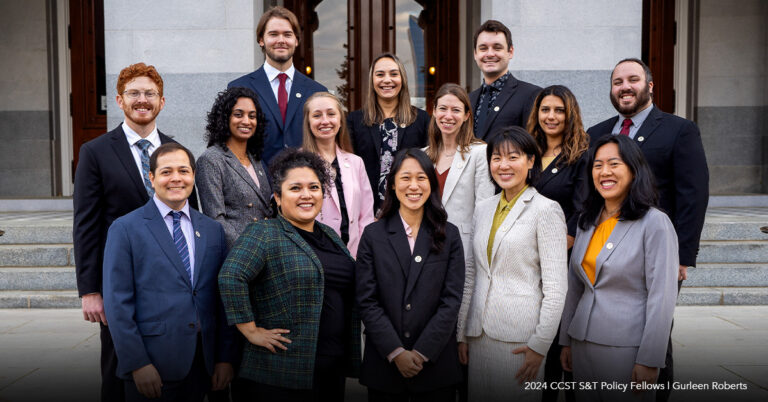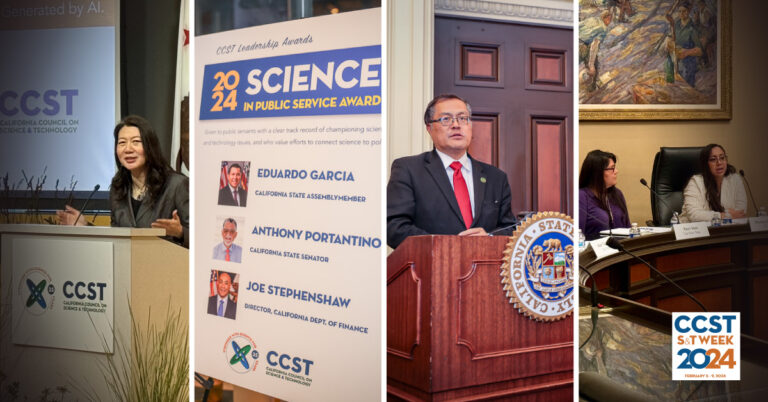Update: Applications for the CCST Science & Technology Policy Fellowship Have Closed
CCST Paper Finds that California Needs to Resolve Regulatory Uncertainties Surrounding Carbon Capture and Storage
January 9, 2015 | CCST Newsroom, Press Releases | Contact: M. Daniel DeCillis
 Carbon capture and storage (CCS) is potentially important for advancing California’s energy future and climate goals, but deploying the technique depends in part on resolving regulatory uncertainties, according to the latest paper in CCST’s California’s Energy Future – Policy series.
Carbon capture and storage (CCS) is potentially important for advancing California’s energy future and climate goals, but deploying the technique depends in part on resolving regulatory uncertainties, according to the latest paper in CCST’s California’s Energy Future – Policy series.
“Almost all solutions developed by the California’s Energy Future project to meet 80% reductions in emissions by 2050 require CCS in some manner,” said CCST Council Member Jane C.S. Long, Former Principal Associate Director at Large, Global Security Directorate Fellow, Center for Global Security Research Lawrence Livermore National Laboratory. “CCST commissioned this white paper to inform the discussion of how to include CCUS in the portfolio of climate options in California.”
The paper tracks the carbon for projects which capture CO2 from gas-fired power plants and sells this CO2 into an enhanced oil recovery market (known as carbon capture “utilization” and storage, or CCUS). Several companies have proposed CCUS projects in California where the economics can be improved by using captured CO2 for CO2-EOR. While many of the component technologies required for such projects are available, significant risks remain, and innovation is required to effectively integrate the technologies, organizations, and industries that comprise CCS-EOR. In theory, California’s climate policies could stimulate such CCUS deployments (within a broader technology portfolio) to advance key climate policy objectives; however, the treatment of these systems under existing regulations is not yet sufficiently well resolved.

Resolving the regulatory uncertainties surrounding CCUS is important because, if successful, early CCUS projects could open the door to several potentially important low-carbon energy systems for California, such as:
- Burning biomass to make electricity and sequestering the CO2 to yield net negative emissions;
- Reforming methane to make hydrogen fuel and sequestering the resulting CO2;
- Applying methods to directly capture CO2 from the air and either sequestering the CO2 or utilizing it to produce low-carbon fuels; and
- Providing dispatchable low-carbon electricity.
The paper addresses these regulatory uncertainties and provides a concrete basis for ongoing policy discussions by evaluating greenhouse gas emissions from a hypothetical CCUS deployment according to a plain reading of the California cap-and-trade program and the California Low Carbon Fuel Standard.
CCST’s California’s Energy Future – Policy (CEF-P) project is intended to help explore a policy framework that will enable the best energy technology deployment decisions for the state of California. It was initiated following the completion of the California’s Energy Future project, which provided detailed analyses of the potential of different energy technologies to reduce California’s emissions by 2050; the CEF-P papers focus exclusively on the implications of these technology analyses for policy.
“CCUS has been identified first as a way to develop CCS in California, but the analysis in this report indicates that significant carbon reductions are afforded by CCUS as a system,” said Long. “Testing out this technology in the state would allow policy makers to understand how much they can count on sequestration and how to regulate it.”






